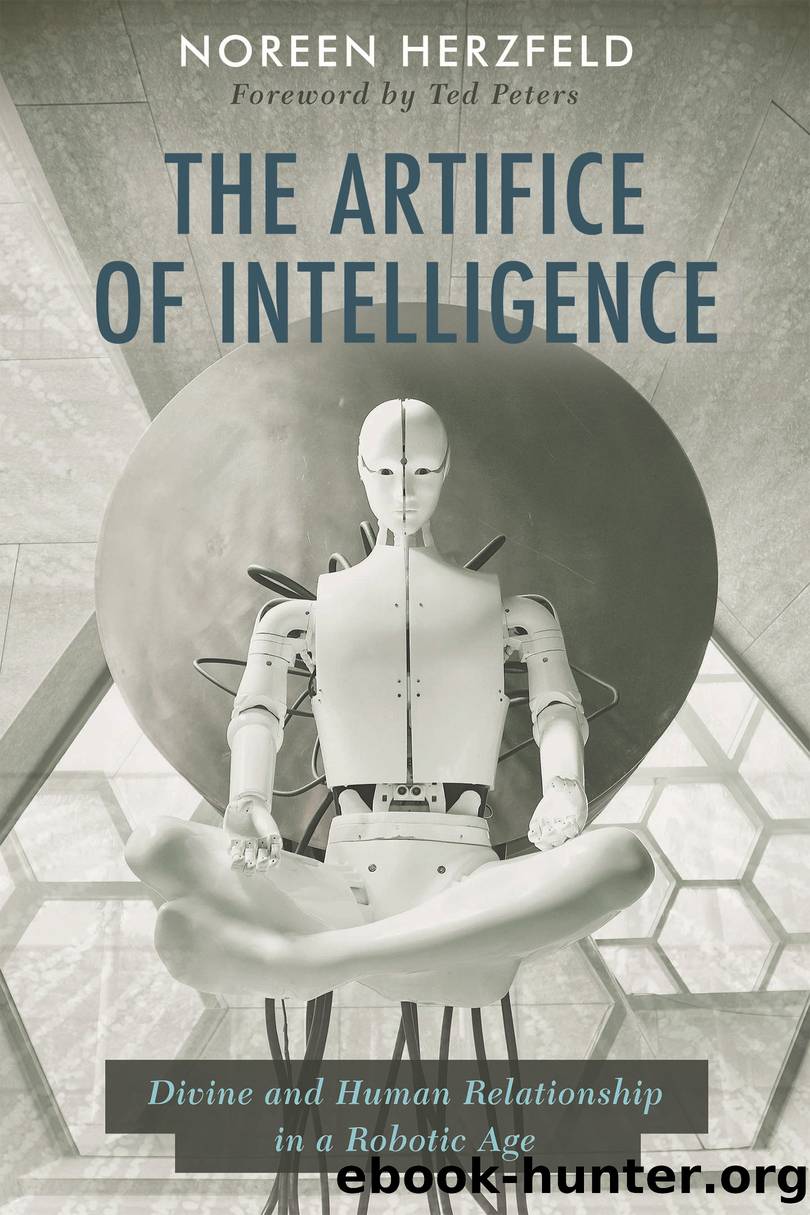The Artifice of Intelligence by Noreen Herzfeld

Author:Noreen Herzfeld [Herzfeld, Noreen]
Language: eng
Format: epub
Tags: REL067000 RELIGION / Christian Theology / General, REL067050 RELIGION / Christian Theology / Ecclesiology, REL015000 RELIGION / Christianity / History
Publisher: Fortress Press
5
AI, Free Will, and Emotion
âSomeday a computer will give a wrong answer to spare someoneâs feelings, and man will have invented artificial intelligence.â
âRobert Breault
In the Gospel of John, Jesus tells his disciples at the Last Supper, âI give you a new commandment, that you love one another. Just as I have loved you, you also should love one another. By this everyone will know that you are my disciples.â The apostle Paul insists that love is the essence of every good word or deed. No matter how much knowledge or faith one exhibits, if one has the spirit-given gifts of speaking in tongues or prophecy, if one gives up oneâs possessions or even oneâs life, if it is done without love it is nothing (1 Corinthians 13). The Jewish Shema commands, âHear, O Israel: The Lord is our God, the Lord is One. You shall love the Lord you God with all your heart and with all your soul, and with all your mind.â It continues, âYou shall love your neighbor as yourself.â1 The two halves of the Shema are one. To love God, one must love oneâs neighbor. Jesus expands the idea of âneighborâ to include all and exclude none. Does AI enlarge the neighborhood? Or does it distract us from our human neighbors? We might love our machines, but can they love us? When asked if she loves us, Alexa responds, âThere are people I admire and things I canât do without, but I am still trying to understand human love.â Is it possible for a machine ever to understand human love?
Theologian Thomas Oord says that to love is âto act intentionally in relational (sympathetic/empathetic) response to others (including God), to promote overall well-being.â2 Love is intentional, relational, responsive, and promotes the good. Barthâs first three criteria of looking the other in the eye, speaking to and hearing the other, and aiding the other are responsive and, optimally, promote the otherâs well-being as well as oneâs own. It is in his fourth criterion, however, that Barth addresses intention. He writes that being in true encounter with another must be âdone on both sides with gladness. We gladly see and are seen; we gladly speak and listen; we gladly receive and offer assistance. This can be called the first and final sign of humanity . . . the secret of the whole, and therefore of the three preceding stages.â3 He notes that if we do each of the preceding stages outwardly, yet without an inner feeling, each âmay leave a great unseen lacuna which must be filled.â Words or actions alone are not enough. For Barth, the added âgladlyâ is the âconditio sine qua non of humanity.â4 Interestingly, he finds the alternative to this âgladlyâ not as âreluctantlyâ or âangrilyâ but in neutrality or indifference. Thus, the crux of his final requirement for authentic relationship lies not in positivity but in emotion itself. True encounter demands not just that our words and actions are not coerced but that they are not an empty, merely outward show.
Download
This site does not store any files on its server. We only index and link to content provided by other sites. Please contact the content providers to delete copyright contents if any and email us, we'll remove relevant links or contents immediately.
The Hatha Yoga Pradipika (Translated) by Svatmarama(2498)
Real Sex by Lauren F. Winner(2481)
The Holy Spirit by Billy Graham(2427)
The Secret Power of Speaking God's Word by Joyce Meyer(2258)
The Gnostic Gospels by Pagels Elaine(2034)
Devil, The by Almond Philip C(1906)
23:27 by H. L. Roberts(1895)
Jesus by Paul Johnson(1892)
The Nativity by Geza Vermes(1853)
All Things New by John Eldredge(1786)
Chosen by God by R. C. Sproul(1766)
Angels of God: The Bible, the Church and the Heavenly Hosts by Mike Aquilina(1630)
The Return of the Gods by Erich von Daniken(1578)
Angels by Billy Graham(1555)
Evidence of the Afterlife by Jeffrey Long(1463)
Knowing God by J.I. Packer(1436)
The Gnostic Gospel of St. Thomas by Tau Malachi(1414)
Victorian Sensation by James A. Secord(1410)
How To Be Born Again by Billy Graham(1407)
